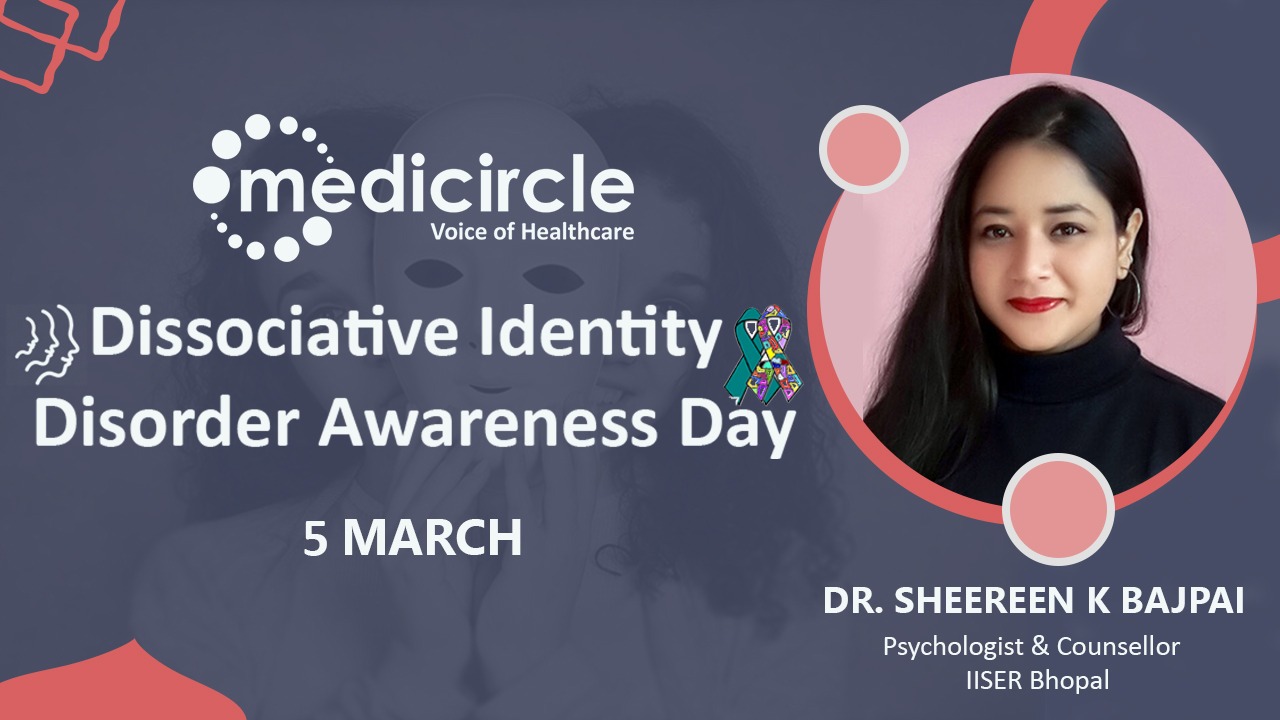Dissociative Identity Disorder (DID) was earlier called Multiple Personality disorder. It often goes unnoticed among the general population. Those who suffer less a terrifying and disturbing life. Dissociative Identity Disorder Awareness Day which is observed each year in March aims to spread this disorder awareness and creates compassion towards the people going through it. Medicircle is conducting an exclusive series on the occasion of Dissociative Identity Disorder (DID) so that people can understand the disorder directly from the experts.
Dr.Sheereen K Bajpai is a psychologist and a counselor at the Indian Institute of Science Education and Research in Bhopal. She has worked previously with prestigious institutes like the National Institute of Fashion Technology, Delhi Public School, CT Group of Institutes, and Jawaharlal Nehru Cancer Hospital and Research Center.
Heal yourself from Dissociative Identity Disorder (DID)
Dr.Sheereen K Bajpai emphasizes, “Dissociative Identity Disorder (DID) has served as a plot for many films, tv-series, and Web series because of the intriguing nature of this disorder. Also, there is some stigma attached as portrayed in crime -series. Dissociative Identity Disorder (DID) also called multiple personality disorder or split personality has some dissociation which is a coping mechanism. All of us experience anxiety, trauma, or any kind of unpleasant experience and as human beings, we try to cope with it. Dissociation is one of the unhealthy coping mechanisms so a person experiences a kind of dissociation where there is a “loss of connection” with their identity, thoughts, and feeling”
Here is what to do if you are diagnosed with Dissociative Identity Disorder (DID)
Dr.Bajpai explains, “If you have been diagnosed with Dissociative Identity Disorder (DID),
Seek psychologist or psychiatrist help. Get knowledge about your experiences with Dissociative Identity Disorder (DID) and ask your doctor about your disorder Learn to adopt good coping mechanisms Do not use any addictive substances like alcohol and weed. Built a support system Talk to your family and friends. Cope up with embarrassment and shame associated with it Practice relaxation techniques, yoga, meditation Creating a daily schedule and keeping yourself busy Try to avoid triggers such as smell, a person which can bring back the memory of traumatic experiences These are not substitutes for treatment but can help you effectively help in managing the problem”
Prevent Dissociative Identity Disorder (DID)
Dr.Bajpai informs,“It is important to be a good role model for your children and build a character for them from within.
Thoughts can help?
Dr.Bajpai points out, “Reframe thinking is very essential for uncontrolled thoughts. Thinking is very much under control and we should learn to stop ruminating ideas. If someone is upset, hopeless, or helpless, we must try and help them to reframe the ideas. Do not give up. Understand this is the problem and these are the solutions. Learning to reframe the ideas is very important and goes a long way in dealing with anxiety, depression, and unexplainable sadness”
The myth about Dissociative Identity Disorder (DID)
Dr.Bajpai breaks the myth,”A patient suffering from Dissociative Identity Disorder (DID) being violent and harmful is a myth. The person is not likely to harm anyone. It's a misconception that patients experiencing this disorder are harmful.It is an alternative state of personality where a person can be outgoing, confident, and happy rather than being harmful. Talk to a mental health care professional to get an accurate picture of Dissociative Identity Disorder (DID)”
Stress and Burnout for Caregivers
Dr.Bajpai explains the caregivers to help the Dissociative Identity Disorder (DID) patients by
“Focus on things that you can control. Be level headed Do not react and give a response Be patient Be calm during the switches of personality Bringing up the past and unpleasant memory”
“Caregivers can experience burnout and stress out. They should speak to the doctor about it. As a caregiver, you should love, take care and extend support of Dissociative Identity Disorder (DID) patients” advises Dr.Bajpai
(Edited by- Dr. Rati Parwani)

 Learn about management if you are diagnosed with Dissociative Identity Disorder (DID) by Dr.Sheereen K Bajpai, Expert Psychologist & Counselor from Indian Institute of Science Education and Research
Learn about management if you are diagnosed with Dissociative Identity Disorder (DID) by Dr.Sheereen K Bajpai, Expert Psychologist & Counselor from Indian Institute of Science Education and Research









.jpeg)


.jpg)







.jpeg)

.jpg)




.jpg)




.png)


